To the uninitiated, a machine shop can look a lot like a torture chamber, and with good reason. Almost any piece of equipment in the shop has the potential to injure you. Walk into a machine shop without training or protective gear, and you have the potential to be pinched, punched, cut, blinded, crushed, impaled, or electrocuted.
For workers, it is critical knowing which machine shop hazards are likely to occur, lowering the likelihood of potential injuries. OSHA assists in making knowledge available with their Basics of Machine Safeguarding information. One of the first safety initiatives in any machine shop is safeguarding equipment, followed by training and personal protective equipment (PPE).
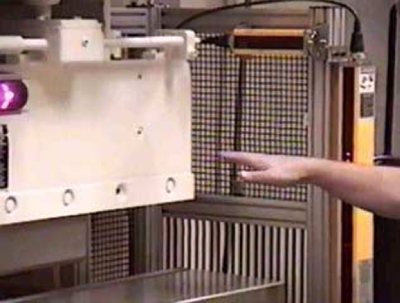
A sensing device is an example of a machine guard.
When it comes to wearing PPE, wearing incorrect safety gear increases the likelihood of injury. For this reason, MCR Safety assists machines shop workers and safety managers by listing out all the common hazards on our Machine Shops industry page. MCR Safety’s PPE and services protect machinists across 17 different hazards.
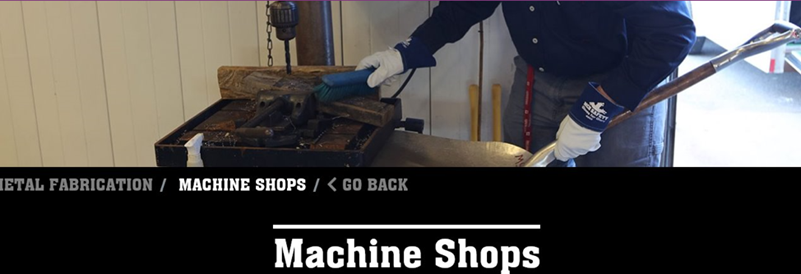
Just click the image to learn more
Applications
Machine shop workers engage in numerous work activities that involve risk and potential injury. Here are some of the activities and applications:
- Setting up and preparing machines
- Clearing jams
- Deburring metal
- Handling hot metal
- Adjusting and operating machines
- Moving metal
- Cleaning machines and work areas
- Lubricating machine parts
- Handling rough machined parts
- Performing maintenance on machine
- Welding
- Grinding out sharp edges
Here is a look at some of the many hazards these workers face:
Amputations
There are an astonishing number of ways to lose a body part in a machine shop. Fifty percent of mechanical power press injuries result in amputations. Bending machines, presses, rolling machines, saws, shears and shaping machines of any kind can easily remove a finger or worse. Anything designed to cut metal, plastic, or wood will have no difficulty cutting through flesh and bone.
Here is a look at the mechanical components OSHA deems hazardous:
- Point of Operation – This is where the machine performs work, including cutting, shaping, boring, and forming.
- Power-Transmission Apparatuses - These are components that transmit energy, such as flywheels, pulleys, belts, chains, couplings, connecting rods, spindles, cams, and gears.
- Moving Parts – These are parts of the machine that move during operation, such as rotating motions that may grip clothing and force a worker’s body into dangerous locations.
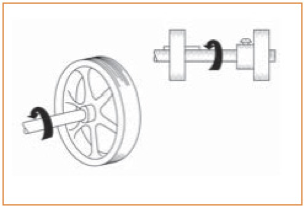
The above image exhibits a rotating motion generated from collars, couplings, clutches, flywheels, spindles and shafts.
Keeping all your bits and pieces attached essentially means keeping your body away from places they do not belong. Use proper techniques and always follow proper safety procedures when using any cutting tools. For example, a metalworker definitely should not wear gloves when a machine is functioning.

MCR Safety’s UCDO and other glove clips are definite needs for any metalworker.
A worker who has not be been properly trained should not be touching metalworking machines. Never let an employer or coworker tell you to use a tool you are not trained to use.
Cut Injuries
When it comes to cut hazards and cut injuries, fingers definitely need protecting when handling metal, materials and parts. From metal burrs, metal chips and finished metalwork pieces, sharp objects are always a concern in a machine shop.
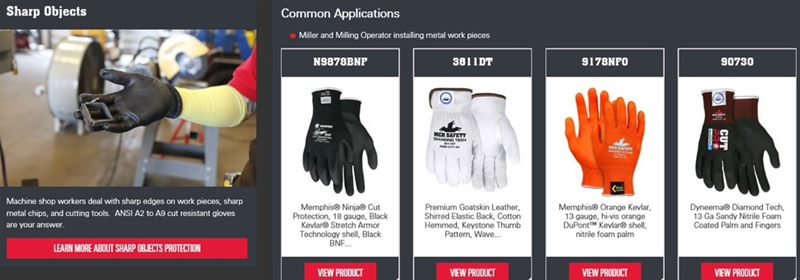
MCR Safety offers gloves with a wide variety of cut protection levels from A2 for light protection and A9 for extreme protection.
Crushes, Impact and Pinch Points
Not everything that injures does so by slicing. Crushes and pinch points are other major hazards in machine shops. Any piece of material or equipment of significant weight can cause crush injuries if dropped, most often injuring insufficiently protected fingers and toes.
In addition to keeping your limbs away from places they should not be, proper lifting and carrying techniques are vital to avoid dropping things on yourself or others. Not sure if you can handle a heavy or awkward object safely? Don’t let your ego get in the way. Ask for help. There is no shame in working together to keep the shop running safely and smoothly for everyone.

With regards to PPE, gloves offering impact protection can prevent injuries. MCR Safety is a leader in gloves that protect against crush injuries as well as cuts, leaving you well covered no matter the type of hazard you face.
Impaired Vision
Flying fragments, particles and projectiles are always a concern for those machining and installing metalwork pieces. Projections such as screws and burrs during machine operations increase the risk of injury. In addition, there are caustic chemicals, solvents, cleaning solutions and UV light during welding. MCR Safety’s eye protection page and online catalog are excellent resources for selecting different eyewear styles: from lined eyewear to face shields and goggles offering 6X greater anti-fog protection.
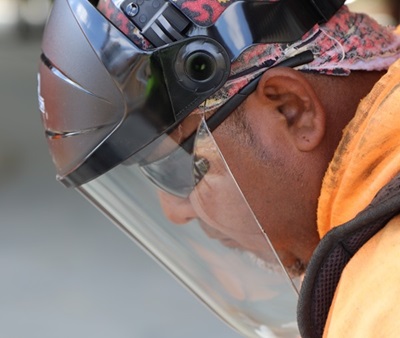
10 percent of all U.S. eye injuries result from the work of brazers, cutters and welders. MCR Safety’s 104PF face shield offers 6X greater anti-fog protection.
Oily Machine Parts
As we highlighted in Safety Tips for Metalworking, lubricants and fluids are used in removing chips from tools, lubricating parts and in cutting operations. While oil always presents a concern, we have designed gloves with excellent gripping properties in oily conditions.

Our BNF and FLT gloves are excellent gloves for gripping in oily conditions.
There are many machine shop hazards.
Abrasions. Burns. Punctures. Welding Sparks. While MCR Safety cannot guarantee that everyone around you will have good habits and a healthy dose of common sense, we can guarantee you will know the best protection needed for hazards faced. We also guarantee that our trained 360 safety specialists will keep you knowledgeable about the best PPE utilized in metal fabrication.
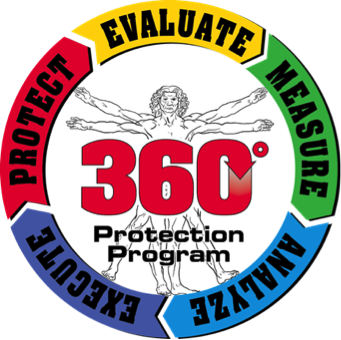
Lack of safety knowledge is often one of the most dangerous hazards. Click the image and request one our trained 360 specialists to visit your machine shop.
For over 40 years, MCR Safety has proven to be a leader in gloves, glasses, and garments. Whether it’s on a shop floor, an oil rig, or a construction site, we are there providing solutions to workplace hazards. We Protect People!
Learn more about MCR Safety. For more information, browse our website, request a catalog, find a distributor, or give us a call at 800-955-6887.
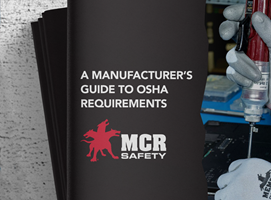
A Manufacturer's Guide to OSHA Requirements
About the Author
Related Articles
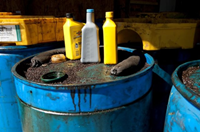
Safety Tips for Metalworking Around Lubricants Greases and Coolants
Metalworking fluids consist of a wide variety of oils, detergents, surfactants, lubricants, and...
New Trends in Manufacturing and Metalworking
There are 517,000 metalworkers working in the Fabricated Metal Product Manufacturing industry....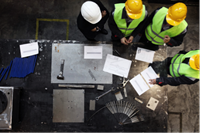
Top Safety Resources
Since we share the responsibility of keeping workers safe, we have picked out some of the best...Latest Articles





